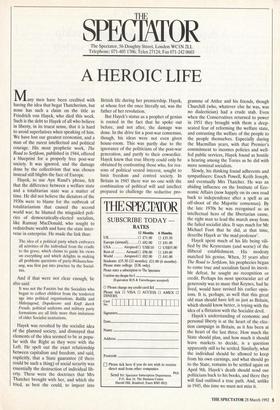SPECTAT THE OR
The Spectator, 56 Doughty Street, London WC1N 2LL Telephone: 071-405 1706; Telex 27124; Fax 071-242 0603
A HEROIC LIFE
Many men have been credited with having the idea that begat Thatcherism, but none has such a claim on the title as Friedrich von Hayek, who died this week. Such is the debt to Hayek of all who believe in liberty, in its truest sense, that it is hard to avoid superlatives when speaking of him. We have lost our greatest economist, and a man of the rarest intellectual and political courage. His most prophetic work, The Road to Serfdom, published in 1944, offered a blueprint for a properly free post-war society. It was ignored, and the damage done by the collectivism that was chosen instead still blights the face of Europe.
Hayek, to use Ayn Rand's phrase, felt that the difference between a welfare state and a totalitarian state was a matter of time. He did not believe the dictators of the 1930s were to blame for the outbreak of totalitarianism that caused the second world war; he blamed the misguided poli- cies of democratically-elected socialists, like Ramsay MacDonald, who sought to redistribute wealth and have the state inter- vene in enterprise. He made the link thus:
The idea of a political party which embraces all activities of the individual from the cradle to the grave, which claims to guide his views on everything and which delights in making all problems questions of party-Wehanschau- ung, was first put into practice by the Social- ists.
And if that were not clear enough, he also said:
It was not the Fascists but the Socialists who began to collect children from the tenderest age into political organisations. Bali& and Hiderjugend, Dopolavoro and Kraft durch Freude, political uniforms and military party formations are all little more than imitations of older Socialist institutions.
Hayek was revolted by the socialist idea of the planned society, and dismayed that elements of the idea seemed to be as popu- lar with the Right as they were with the Left. He spelt out the exact relationship between capitalism and freedom, and said, explicitly, that a State guarantee (if there could be such a thing) of social security was essentially the destruction of individual lib- erty. These were the doctrines that Mrs Thatcher brought with her, and which she tried, as best she could, to import into British life during her premiership. Hayek, at whose feet she once literally sat, was the father of her revolution.
But Hayek's status as a prophet of genius is rooted in the fact that he spoke out before, and not after, the damage was done. In the drive for a post-war consensus, though, his ideas were not even given house-room. This was partly due to the ignorance of the politicians of the post-war generation, and partly to their cowardice. Hayek knew that true liberty could only be obtained by confronting those who, for rea- sons of political vested interest, sought to limit freedom and control society. In Britain in 1945 there was no one with the combination of political will and intellect prepared to challenge the seductive pro- gramme of Attlee and his friends, though Churchill (who, whatever else he was, was no dialectician) had a crude stab. Even when the Conservatives returned to power in 1951 they brought with them a deep- seated fear of reforming the welfare state, and entrusting the welfare of the people to the people themselves. Especially during the Macmillan years, with that Premier's commitment to incomes policies and well- fed public services, Hayek found as hostile a hearing among the Tories as he did with more nominal socialists.
Slowly, his thinking found adherents and sympathisers: Enoch Powell, Keith Joseph, and eventually Mrs Thatcher. He was an abiding influence on the Institute of Eco- nomic Affairs (now happily on its own road back to independence after a spell as an off-shoot of the Majorite consensus). By the late 1970s he was recognised as an intellectual hero of the libertarian cause, the right man to lead the march away from the failed socialist idea. It says much for Mr Michael Foot that he did, at that time, describe Hayek as 'the mad professor'.
Hayek spent much of his life being vili- fied by the Keynesians (and worse) of the illiberal establishment. His modesty matched his genius. When, 35 years after The Road to Serfdom, his prophecies began to come true and socialism faced its inevit- ble defeat, he sought no recognition or credit. Perhaps his most spectacular act of generosity was to muse that Keynes, had he lived, would have revised his earlier opin- ions. It is, perhaps, as well that this great old man should have left us just as Britain, which should know better, is toying with the idea of a flirtation with the Socialist devil.
Hayek's understanding of economic and personal liberty is at the heart of the elec- tion campaign in Britain, as it has been at the heart of the last three. How much the State should plan, and how much it should leave markets to decide, is a question apparently still to be settled. Similarly, what the individual should be allowed to keep from his own earnings, and what should go to the State, remains to be settled again on April 9th. Hayek's death should send our politicians back to his books, and there they will find outlined a true path. And, unlike in 1945, this time we must not miss it.


























































 Previous page
Previous page